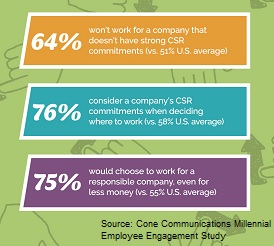Since 2015, millennials have made up the largest generation in the U.S. workforce. With the next class of millennials just graduating college, many organizations are looking to leverage every opportunity to secure top talent, and human resources professionals must be prepared to compete. According to the latest numbers from the Bureau of Labor Statistics, the falling unemployment rate points to this being a candidate’s market.
When recruiting departments think about hiring millennials, the first strategies that may typically come to mind involve free lunches, generous vacation policies, work from home flexibility, and pets in the office. However, organizations may be ignoring one of the most effective millennial recruitment messages in their arsenal: offering employees the opportunity to give back and contribute to a higher purpose.
According to a 2017 Deloitte Millennial Survey, millennials want to work for a company that makes a positive impact on society. More importantly, employees are more likely to stay with their employers if they feel that their jobs have meaning and that they are able to make a difference.
Provide a sense of empowerment
That same Deloitte survey found that while millennials hold themselves accountable for many issues in both the workplace and the world at large, they also feel that their influence for effecting real change is limited. When their workplace offers opportunities to give back, though, “millennials are significantly more likely to say they can influence social equality, the environment, the behavior of big businesses, and even the overall directions of their countries.”
In this way, employers have an opportunity to provide millennials with something they want: a sense of empowerment. That said, it’s key to offer employees opportunities to contribute to the issues that mean the most to them. Employers should take the time to survey employees on the causes they care most about and the ways in which they’d like to contribute to those causes. This knowledge will power the collaboration between corporate responsibility (CR) and HR to create employee giving and volunteering programs that everyone — and millennials in particular — want to be a part of, and will in turn foster a sense of purpose for those looking to make a difference.
Show impact
CR is evolving to become a more sophisticated, results-driven function of the business. While it used to be that simply having a CR program checked the “doing good” or “giving back” box for an organization, nowadays, employees, consumers, donors and other stakeholders are looking for measureable impact.
This is especially important for millennials. It’s not enough for them to know that their employer donated $10,000 to a nonprofit that works to increase access to clean drinking water; they want to know how many people are now able to access clean water and how the lives of those people have improved as a result.
Whether an organization’s CR program incorporates volunteerism, employee giving or corporate grants programs, the ability to demonstrate results and tell an impact story is key for attracting millennial talent.
As HR departments continue to develop their millennial recruiting strategies, it’s crucial to keep in mind just how important the ability to make a difference and affect change is to millennials in their decision to work for a company. In fact, the  2016 Cone Communications Millennial Employee Engagement Study found that three-quarters of millennials would actually take a pay cut in order to work for a socially conscious organization. For HR, this means working closely with CR departments in creating programs that drive engagement through employee buy-in and demonstrated results. It also means working with recruiting teams to best highlight their organization’s ability to affect social good in conversations with prospective talent.
2016 Cone Communications Millennial Employee Engagement Study found that three-quarters of millennials would actually take a pay cut in order to work for a socially conscious organization. For HR, this means working closely with CR departments in creating programs that drive engagement through employee buy-in and demonstrated results. It also means working with recruiting teams to best highlight their organization’s ability to affect social good in conversations with prospective talent.
Ultimately, you and your organization want to recruit the best talent possible while also providing employees with the feeling that their jobs have meaning and purpose. Highlighting the social good your organization does for prospective employees creates an ‘everybody wins’ scenario.
